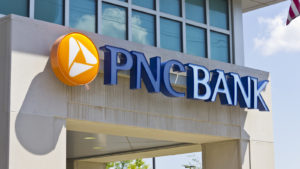On my StockTwits account on March 27, I wrote, “My view is that the “banking crisis” was a relatively minor situation involving a few troubled banks that the Fed and other central banks could handle relatively easily.” I added that, “The Fed/FDIC system was created to stop banking runs and prevent banking runs from becoming contagious…and the system, not too shockingly, worked this time.” Recent data released by the Federal Reserve appear to back up my theory. Consequently, I believe that there are many good regional bank stocks to buy at this point.
On March 24, the Fed reported that the amount of money lent to banks by its “discount window and its Bank Term Funding Program in the week ended March 23” had dropped by $1 billion versus the previous week. Moreover, the amount borrowed by banks from the Fed’s Federal Home Loan Bank came in at $304 billion, well down from $823 billion at the end of last year.
UBS analysts believe that the data, taken together, indicates that banks’ liquidity “is stabilizing,” Seeking Alpha reported.
With banks’ liquidity stabilizing and many regional banks trading at unjustifiably low valuations, here are three good regional bank stocks to buy at this point.
Western Alliance Bancorporation (WAL)

As I pointed out in a previous column, Arizona-based Western Alliance Bancorporation (NYSE:WAL) is well-positioned to benefit from the onshoring trend, as many companies, including chip giants Intel (NASDAQ:INTC) and Taiwan Semiconductor (NYSE:TSM), are building large factories in the state.
Also noteworthy is that, in marked contrast to the American banks that recently failed, WAL “has very little of its funds in fixed-income assets, it has invested a meaningful portion of its assets in highly rated securities, and the mean duration of its assets is a relatively short 5.5 years.”
Additionally, the bank has relatively little exposure to tech firms, which helped bring about Silicon Valley’s downfall. Only 14% of its deposits at the end of last year were made by tech firms, Bloomberg reported.
Finally, a highly successful hedge fund, Citadel, has obtained a 5.4% stake in WAL, and the current price-earnings ratio of WAL is a tiny 3.7.
PNC Financial (PNC)

One of the largest U.S. regional banks, PNC Financial (NYSE:PNC) received a vote of confidence from one of the major credit ratings agencies, Fitch Ratings, back in October. Specifically, Fitch affirmed PNC’s A+ rating with a “stable” outlook.
Wells Fargo is also confident in PNC, as Wells on March 22 added PNC stock to its “Signature Picks” list. Wells believes PNC has a strong balance sheet, while its stock offers a favorable risk-reward ratio. Finally, Wells reported that PNC has a “lower credit risk historically” and “strong technology.” The firm kept an “overweight “rating on the shares.
Also worth noting is that PNC’s deposits fell only 4.6% in 2022, and, according to Seeking Alpha contributor JR Research, it has “high-quality underwriting standards.”
The forward price-earnings ratio of PNC stock is a very small 8.2.
Comerica (CMA)

Dallas-based Comerica (NYSE:CMA) is well-positioned to benefit from the booming growth of the Texas city’s northern suburbs.
For example, Fisher Investments and Caterpillar (NYSE:CAT) both are moving their headquarters to the area, while the exurb town of Sherman is going to become a chip-manufacturing hub for Texas Instruments (NASDAQ:TXN) and Frisco, located about 40 minutes northwest of Dallas by automobile, will, in the coming years, will become host to a Universal park.
Meanwhile, about 50 minutes away, McKinney is greatly expanding its small airport.
On March 10, Citi put CMA stock “on its focus list,”arguing that the shares give investors a “compelling” opportunity due to their low valuation. Moreover, the firm called CMA one of “the best regional bank plays.”
And Comerica generated roughly $1.4 billion of operating income last year, giving it the ability to raise its interest rates if necessary, a Seeking Alpha columnist, The Value Investor, reported on March 16.
CMA stock has a low trailing price-earnings ratio of 5.3 and a high dividend yield of 6.6%.
As of the date of publication, Larry Ramer owned shares of WAL. The opinions expressed in this article are those of the writer, subject to the InvestorPlace.com Publishing Guidelines.
